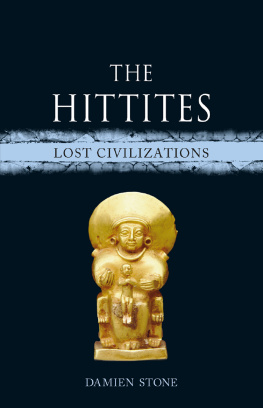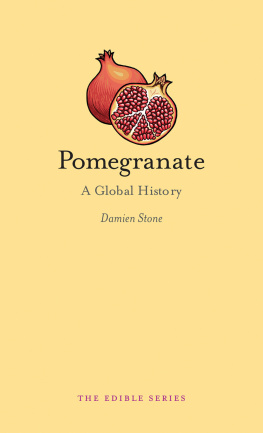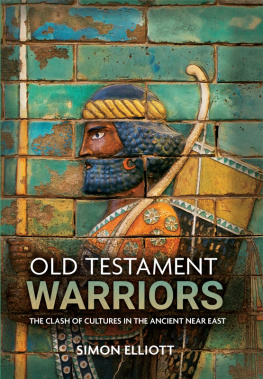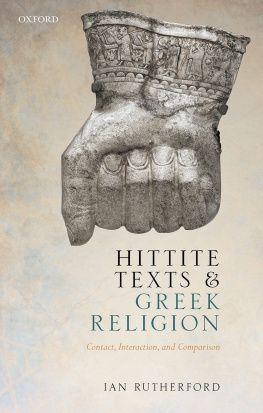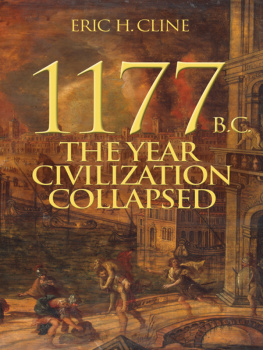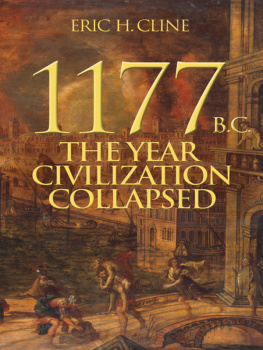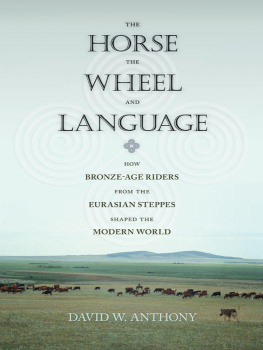The books in this series explore the rise and fall of the great civilizations and peoples of the ancient world. Each book considers not only their history but their art, culture and lasting legacy and asks why they remain important and relevant in our world today.
No part of this publication may be reproduced, stored in a retrieval system, or transmitted, in any form or by any means, electronic, mechanical, photocopying, recording or otherwise, without the prior permission of the publishers
Printed and bound in India by Replika Press Pvt. Ltd
| c. 96008000 BC | Circular groups of carved T-shaped pillars are constructed at Gbekli Tepe (some of the earliest known man-made structures). The site has been dubbed the worlds oldest temple |
| c. 74005200 BC | Occupation of settlement at atalhyk one of the earliest villages in the world |
| c. 35003000 BC | Writing is invented in Mesopotamia by the Sumerians. The cuneiform script would later be adopted by the Hittites |
| c. 2500 BC | Great Sphinx of Giza is constructed for Khafre. Representing Egyptian kings in this form subsequently became a pharaonic tradition. The mythical creature was adopted in the imagery of many other cultures of the ancient Near East and Mediterranean, including the Hittites |
| c. 23342154 BC | The period of the worlds first empire, the Akkadians, founded by King Sargon the Great. Documents from his reign attest to the earliest mention of the Hattians in Anatolia. The language of the Akkadians remained in use by the peoples of Mesopotamia until around the start of the sixth century BC. Akkadian became the language of international diplomacy, used for communication between major powers, including the Hittites |
| c. 21st18th century BC | Merchants from Assyria operate trading colonies in Anatolia known as kr. The most notable of these was at Kltepe |
| c. 18th century BC | The exploits of Pithana and his son Anitta are documented in the first known text composed in the Hittite language |
| c. 1800 BC | Earliest-known Old Babylonian version of the Epic of Gilgamesh, a myth that enjoyed popularity throughout the ancient Near East |
| c. 1650 BC | The founding of the Hittite Old Kingdom. Hattusa becomes the Hittite capital under King Hattusili I |
| c. 1595 BC | The Hittite king Mursili I sacks the city of Babylon, bringing an end to the Old Babylonian empire |
| c. 1400 BC | Beginning of the Hittite New Kingdom |
| c. 13601332 BC | The Amarna letters attest an age of international diplomacy between the powers of the ancient Near East |
| c. 13501322 BC | The kingdom becomes an empire during the reign of Suppiluliuma I, regarded as the greatest of the Hittite kings |
| 1274 BC | The Battle of Qadesh takes place between the Egyptians (under Ramesses II) and the Hittite Empire (ruled by Muwatalli II). It results in a stalemate, leading to the drawing up of the EgyptianHittite peace treaty some fifteen years later |
| c. 1250 BC | Traditional date for the Trojan War, as given by Herodotus |
| c. 1180 BC | Destruction of Hattusa and the collapse of the Hittite Empire. Several other states also disappeared around this time, in what has become known as the Bronze Age collapse |
| c. 1180700 BC | Traces of Hittite culture and the Luwian writing system continue being used by the Neo-Hittite (or Syro-Hittite) states |
| 8th century BC | Height of the Phrygian state in Anatolia, based at their capital of Gordion. There is a level of Phrygian occupation at Hattusa, some five hundred years after the Hittite evacuation of the site |
| c. 730700 BC | Hesiod composes the Theogony, which describes the origins of the ancient Greek gods. There are remarkable similarities between this work and the much earlier Hurrio-Hittite Kumarbi cycle. Traders were likely responsible for not only exchanging goods between east and west, but the sharing of such stories orally |
| 546 BC | Cyrus the Great conquers the Lydian king Croesus, bringing Asia Minor under Persian rule. The Lydians are credited with the invention of coinage |
| 499449 BC | The Graeco-Persian wars. A memorable episode in Herodotus Histories describes Xerxes attempt to cross from Asia into Europe by building pontoon bridges across the Hellespont (the modern Dardanelles). A storm destroyed the structure before the army was able to cross. The enraged Persian king was reported to have punished the Hellespont with three hundred whiplashes, throwing fetters into the water and branding it with red-hot irons |
| c. 350 BC | The Mausoleum at Halicarnassus, one of the Seven Wonders of the Ancient World, is built (at what is now Bodrum on the west coast of Turkey) |
| 323 BC | After forging a huge empire, which stretched from Greece to India, Alexander the Great dies in Babylon |
| 282133 BC | The Hellenistic Attalid dynasty governs the kingdom of Pergamon in Asia Minor. The fall of the state to the Roman Republic sees many Greek cities in Turkey (such as Ephesus) become Roman. |
| 27 BC | The Roman Republic becomes the Roman Empire under Augustus Caesar |
| c. AD 5 | Birth of St Paul the Apostle. Born to a Jewish family from Tarsus, he converted to Christianity after being struck by a vision of the Ascension of Jesus, which left him blinded for three days. Over the sixty years of his life, he travelled extensively, preaching and establishing a number of Christian communities in Turkey |

